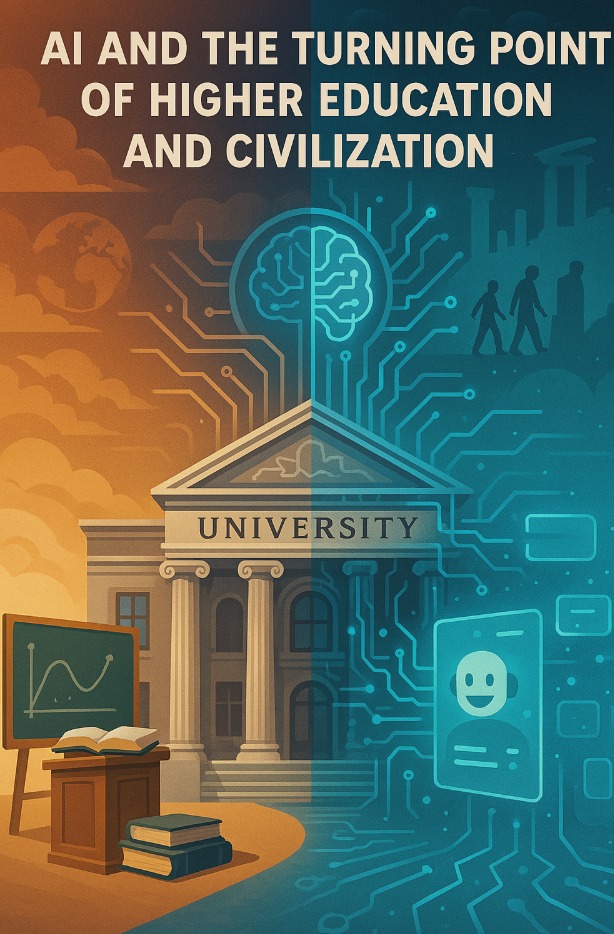
The world is racing forward at a breakneck pace, propelled by changes that are not just exponential but paradigm-shifting. The last thirty years have confronted us with monumental challenges: the escalating climate crisis, mass migration destabilizing democracies, the erosion of trust in institutions, and now the advent of artificial intelligence, a force poised to reshape every sector of our lives. As an educator with decades of experience and a passion for sustainability, I view this intersection of crises and opportunities with a blend of hope and trepidation.
AI, particularly generative AI, is the most significant disruptor we’ve faced in centuries. Its potential to accelerate knowledge, foster equity, and redefine what it means to learn and work is unparalleled. Yet, it also threatens to deepen divides, weaken traditional structures, and exacerbate the instability we are already grappling with. Nowhere is this duality more pronounced than in education—especially higher education.
The Historical Moment of AI in Education
In my book University Revolution: Artificial Intelligence and the Transformation of Learning, I reflect on how universities—those venerable institutions born from the ideals of 19th-century Germany—have lost their way. Wilhelm von Humboldt envisioned education as integrally linked to research, a space where teaching was meant to inspire students to think critically and create knowledge. Somewhere along the way, the lecture hall replaced the forum, rote memorization supplanted critical engagement, and faculty became researchers first, educators second.
AI offers us a chance to course-correct. This technology can tear down the inequities entrenched in the education system, offering personalized, adaptive learning to every student regardless of geography, privilege, or prior preparation. A student in Ghana using ChatGPT can now access the same resources as a student at a top-tier U.S. university. For the first time, knowledge is democratized at scale.
Yet, we must tread carefully. If wielded without foresight, AI could also reinforce inequities, erode critical thinking, and render education a transactional experience rather than a transformative one. The very essence of education—fostering curiosity, creativity, and the capacity to question—could be lost if we view AI as a substitute for teaching rather than a tool to enhance it.
The Existential Crisis of Universities
Higher education is facing an existential reckoning, one that AI will amplify. Declining birth rates, political polarization, and the skyrocketing cost of tuition have already destabilized traditional universities. AI accelerates this instability by challenging the very premise of a degree. Why spend four years and tens of thousands of dollars when AI tutors can deliver two years’ worth of learning in six weeks, as recent studies suggest?
This is not a hypothetical future; it is happening now. Students are questioning the value of higher education as they turn to stackable credentials, online platforms, and self-directed learning powered by AI. Meanwhile, universities are clinging to outdated models, failing to adapt to the realities of Generation Z—a generation that values flexibility, technology, and real-world applications of knowledge.
AI as a Force for Equity and Hope
Despite these challenges, I remain hopeful. AI’s potential to address global inequities in education is immense. Imagine a world where every child has access to a personal AI tutor, tailored to their learning style and pace. Where under-resourced schools can bridge the gaps left by inadequate funding or teacher shortages. Where lifelong learning becomes the norm, empowering workers displaced by automation to reskill and thrive in new industries.
The key lies in how we integrate AI into our educational systems. It is not enough to replace textbooks with algorithms or lectures with chatbots. We must design systems that prioritize learning over content delivery, critical thinking over rote memorization, and creativity over conformity. Faculty must evolve from being dispensers of knowledge to facilitators of learning, guiding students to question, analyze, and innovate.
A Call to Action
The choices we make today will define the role of AI in education—and in society—for generations to come. Will we allow it to perpetuate existing inequities, or will we harness its power to create a more just and sustainable future? Will we use it to dismantle the ivory tower of higher education, or will we reimagine the university as a hub of innovation and equity?
As someone who has spent a lifetime in education and sustainability, I urge us to embrace AI not as a threat but as an opportunity. Yes, it will displace jobs, disrupt institutions, and challenge long-held beliefs. But it also offers us the chance to rebuild—to create a world where education is a right, not a privilege, and where knowledge is a force for liberation, not division.
AI is here, and the times, as Bob Dylan sang, are indeed changing. Let’s make sure they change for the better.